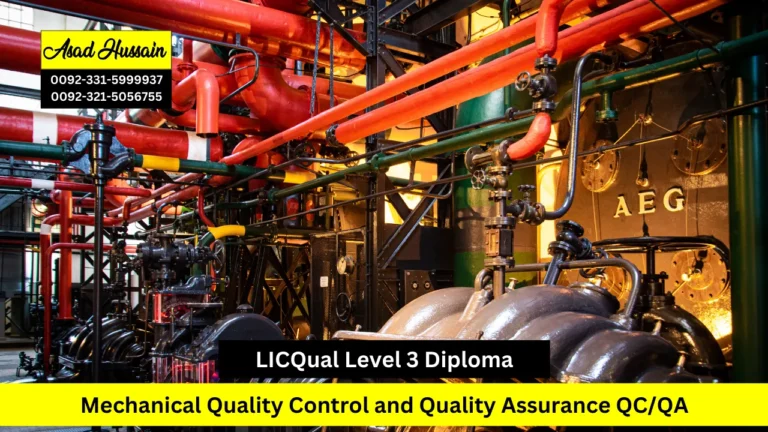The LICQual Level 7 Postgraduate Diploma in Healthcare Quality and Patient Safety is a prestigious, globally recognized qualification designed to equip healthcare professionals with the advanced expertise required to lead, manage, and sustain quality improvement initiatives within healthcare organizations. In today’s dynamic healthcare environment, ensuring patient safety and delivering high-quality care are critical priorities. This program empowers learners to develop strategic, analytical, and leadership skills that drive excellence in healthcare performance, risk management, and patient-centered outcomes.
LICQual Level 7 Postgraduate Diploma in Healthcare Quality and Patient Safety focuses on aligning healthcare practices with international standards and evidence-based frameworks. Learners gain an in-depth understanding of clinical governance, quality assurance systems, and patient safety protocols essential for improving healthcare delivery. Through interactive modules and applied learning, the course strengthens the ability to evaluate, monitor, and enhance healthcare quality using global benchmarks and performance indicators.
The LICQual Level 7 Diploma in Healthcare Quality and Patient Safety offers a comprehensive approach to understanding quality management principles in hospitals and healthcare institutions. Participants explore tools such as root cause analysis, failure mode and effects analysis (FMEA), and continuous quality improvement (CQI) techniques. These competencies enable professionals to identify gaps, minimize clinical errors, and foster a culture of transparency and accountability across healthcare systems.
Program Highlights
Mandatory Units
- Advanced Principles of Healthcare Quality Management
- Patient Safety and Risk Management in Healthcare
- Clinical Governance and Regulatory Compliance
- Leadership in Quality and Patient Safety
- Healthcare Data Analytics and Quality Improvement
- Research Project in Healthcare Quality and Patient Safety
The LICQual Level 7 Postgraduate Diploma in Healthcare Quality and Patient Safety is designed for professionals seeking to advance their expertise in healthcare leadership, clinical governance, and patient safety management. To ensure that learners can fully benefit from this postgraduate qualification, applicants are expected to meet certain academic, professional, and language proficiency requirements. These entry criteria maintain the course’s academic rigor and ensure alignment with international postgraduate study standards.
Age Requirements
• Learners must be 21 years of age or older at the time of enrollment.
• Mature learners aged 25 and above without formal qualifications may also be considered based on relevant professional experience and a strong motivation to pursue the program.
Educational Requirements
• A recognized bachelor’s degree or equivalent qualification in healthcare, nursing, public health, management, or any related discipline.
• Candidates holding a Level 6 Diploma in Healthcare Management or a closely related qualification are also eligible for direct entry.
• Applicants with extensive professional experience in the healthcare sector but limited formal education may be accepted through Recognition of Prior Learning (RPL) assessment.
Professional Experience
• Minimum of two years of relevant work experience in healthcare, hospital administration, quality management, or patient safety roles.
• Professionals currently employed in healthcare organizations, hospitals, or regulatory bodies are strongly encouraged to apply.
• Experience in supervisory or leadership roles in healthcare will be an added advantage.
English Language Proficiency
• Learners must demonstrate proficiency in English, as all course materials and assessments are conducted in English.
• Applicants from non-English-speaking countries should provide evidence of English proficiency, such as IELTS (minimum score of 6.0) or equivalent.
• Alternatively, learners who have completed previous education in English may be exempted from submitting test scores.
The LICQual Level 7 Postgraduate Diploma in Healthcare Quality and Patient Safety ensures that learners are well-prepared to engage with advanced healthcare management concepts. This pathway allows professionals to strengthen their academic foundation, enhance their leadership competencies, and contribute effectively to improving healthcare quality and patient outcomes on a global scale.
The LICQual Level 7 Postgraduate Diploma in Healthcare Quality and Patient Safety is designed to develop advanced-level professionals capable of driving organizational excellence, ensuring patient safety, and implementing sustainable quality improvement strategies in healthcare environments. The program blends theoretical understanding with practical applications, enabling learners to lead initiatives that enhance healthcare quality, minimize clinical risks, and promote patient-centered outcomes. Upon completing the course, learners will possess the strategic, analytical, and leadership skills required to influence policy, manage systems, and foster a culture of continuous improvement in healthcare settings.
Advanced Principles of Healthcare Quality Management
• Develop a comprehensive understanding of global quality management frameworks, standards, and accreditation systems in healthcare.
• Design and implement effective quality assurance programs that enhance organizational efficiency and patient satisfaction.
• Apply evidence-based approaches to monitor, evaluate, and improve healthcare quality using measurable performance indicators.
• Integrate quality management principles into healthcare policies, processes, and decision-making strategies.
• Critically assess quality improvement models and their applicability in different healthcare contexts.
Patient Safety and Risk Management in Healthcare
• Analyze key principles of patient safety, risk assessment, and adverse event prevention in healthcare environments.
• Implement structured risk management systems to identify, assess, and mitigate potential safety hazards.
• Evaluate patient safety culture and develop strategies to strengthen communication, accountability, and transparency.
• Apply tools such as Root Cause Analysis (RCA) and Failure Mode and Effects Analysis (FMEA) to manage safety incidents.
• Promote a proactive approach to patient safety through continuous training and performance improvement programs.
Clinical Governance and Regulatory Compliance
• Demonstrate in-depth understanding of clinical governance frameworks and their role in enhancing accountability and service quality.
• Evaluate healthcare regulatory standards, accreditation requirements, and compliance strategies at national and international levels.
• Develop and implement policies that align with ethical, legal, and professional standards in healthcare delivery.
• Assess the effectiveness of quality audits, clinical reviews, and performance evaluations in supporting governance practices.
• Foster a culture of continuous improvement by ensuring adherence to clinical and operational compliance guidelines.
Leadership in Quality and Patient Safety
• Develop advanced leadership and management skills to lead multidisciplinary healthcare teams effectively.
• Apply strategic leadership theories to promote a culture of safety, quality, and continuous learning within healthcare institutions.
• Inspire innovation and accountability by implementing leadership strategies that drive quality enhancement.
• Manage change effectively through evidence-based decision-making, conflict resolution, and team empowerment.
• Demonstrate ethical leadership by aligning patient safety goals with organizational missions and healthcare standards.
Healthcare Data Analytics and Quality Improvement
• Utilize healthcare data analytics tools to measure, monitor, and evaluate quality performance indicators.
• Apply statistical and analytical methods to identify trends, patterns, and improvement opportunities in healthcare delivery.
• Integrate digital health technologies and data-driven insights into quality improvement initiatives.
• Design data management systems that ensure accuracy, security, and ethical use of patient information.
• Assess the role of big data and artificial intelligence in transforming healthcare quality and safety outcomes.
Research Project in Healthcare Quality and Patient Safety
• Conduct independent research on contemporary issues in healthcare quality and patient safety using advanced methodologies.
• Critically analyze research findings to develop innovative solutions for improving healthcare practices.
• Apply ethical research principles and data integrity standards throughout the project lifecycle.
• Present evidence-based recommendations that support healthcare quality enhancement and patient safety initiatives.
• Demonstrate advanced academic writing, critical thinking, and analytical skills through a comprehensive research report.
The LICQual Level 7 Postgraduate Diploma in Healthcare Quality and Patient Safety, learners will emerge as highly skilled professionals ready to lead quality improvement and patient safety programs within healthcare institutions worldwide. They will possess the ability to integrate governance, leadership, and analytical expertise to ensure excellence, compliance, and innovation in healthcare management, thereby contributing to safer and more effective global healthcare systems.
The LICQual Level 7 Postgraduate Diploma in Healthcare Quality and Patient Safety is an internationally recognized qualification designed for healthcare professionals, administrators, and quality management specialists who aspire to lead patient safety initiatives and ensure excellence in healthcare delivery. In an era where patient safety and quality of care define the credibility and effectiveness of healthcare organizations, this qualification empowers learners to establish robust safety systems, drive continuous quality improvement, and promote evidence-based practices across healthcare settings. The program focuses on developing advanced knowledge, analytical skills, and leadership capabilities essential for building safe, efficient, and patient-centered healthcare systems aligned with global quality standards.
Healthcare Leaders and Managers
• Professionals currently in or aspiring to leadership roles within hospitals, clinics, and healthcare organizations.
• Managers responsible for developing, implementing, and evaluating healthcare quality improvement and patient safety strategies.
• Individuals seeking to enhance decision-making and leadership competencies in managing patient safety and healthcare governance.
• Leaders focused on improving care delivery through data-driven performance evaluation, regulatory compliance, and patient satisfaction.
• Administrators committed to building healthcare systems that prioritize clinical excellence, operational efficiency, and safety outcomes.
Healthcare Professionals and Practitioners
• Doctors, nurses, and allied health professionals dedicated to improving patient safety and maintaining the highest quality standards in care delivery.
• Practitioners seeking to expand their understanding of safety protocols, clinical governance, and quality improvement processes.
• Professionals aiming to reduce medical errors and improve patient outcomes through evidence-based and systematic approaches.
• Clinicians focused on implementing safety guidelines, infection prevention strategies, and risk assessment models in healthcare environments.
• Learners striving to strengthen their practical expertise in applying healthcare quality and patient safety frameworks in real-world settings.
Quality and Risk Management Officers
• Professionals responsible for healthcare quality assurance, risk assessment, and safety management in clinical and non-clinical departments.
• Individuals engaged in conducting quality audits, evaluating patient safety indicators, and implementing performance improvement measures.
• Managers and officers specializing in risk reduction, incident reporting, and safety culture development across healthcare organizations.
• Learners committed to developing skills in root cause analysis, failure mode and effects analysis (FMEA), and continuous quality improvement (CQI).
• Leaders promoting proactive risk management and fostering a culture of learning, accountability, and safety awareness.
Policy Makers and Healthcare Administrators
• Policy makers and administrators involved in developing healthcare quality governance frameworks and patient safety policies.
• Professionals responsible for ensuring compliance with national and international healthcare standards and accreditation requirements.
• Individuals overseeing safety audits, healthcare regulations, and strategic planning for quality and risk management systems.
• Administrators managing healthcare quality departments, accreditation programs, and institutional governance structures.
• Leaders committed to advancing quality assurance, performance monitoring, and safety reforms in healthcare organizations.
Supervisors and Departmental Heads
• Supervisors overseeing healthcare quality operations and ensuring adherence to clinical safety protocols and standards.
• Departmental heads responsible for implementing patient safety programs, monitoring quality metrics, and managing healthcare risks.
• Professionals coordinating multidisciplinary quality improvement activities to enhance care delivery and organizational outcomes.
• Managers conducting audits, reviews, and performance evaluations to strengthen compliance and operational safety.
• Leaders dedicated to fostering a culture of continuous improvement, transparency, and accountability across healthcare teams.
Career-Focused Learners and Future Healthcare Leaders
• Individuals aspiring to build careers in healthcare quality management, patient safety, or healthcare administration.
• Learners preparing for leadership positions in hospitals, accreditation bodies, or health regulatory agencies.
• Professionals seeking to enhance their career prospects in healthcare governance, clinical quality, and safety leadership roles.
• Career-driven individuals motivated to integrate innovative practices and digital tools to elevate patient safety standards.
• Learners committed to becoming influential leaders capable of transforming healthcare organizations through strategic quality management and safety innovation.
The LICQual Level 7 Postgraduate Diploma in Healthcare Quality and Patient Safety is ideal for professionals determined to advance their expertise in quality governance, patient safety, and healthcare leadership. Graduates will gain the knowledge and confidence to design, implement, and manage quality improvement programs that align with international patient safety standards. This qualification opens pathways to senior-level roles such as quality directors, patient safety managers, and healthcare consultants—empowering professionals to drive excellence, accountability, and innovation in healthcare systems worldwide.







